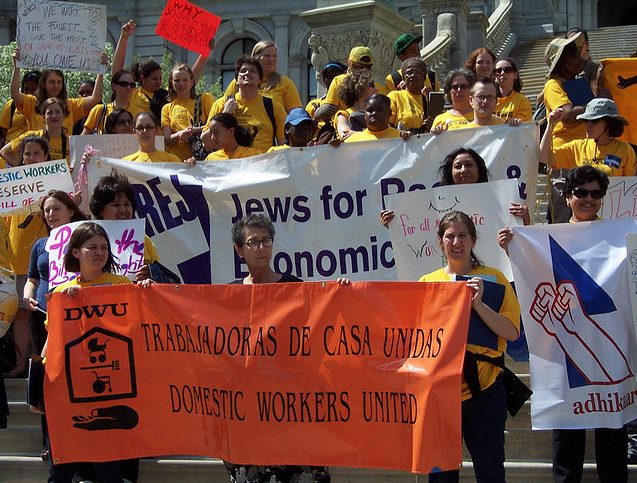Domestic Workers’ Activism On the Rise in Georgia and Illinois
Organizing in Georgia and Illinois shows that the domestic workers’ movement is not exclusive to predictable blue states.

In the 1880s, a group of washerwomen in Atlanta went on strike to demand better wages and treatment. After enduring arrests and fines, the women won their demands. This was the earliest evidence of domestic worker organizing in Georgia. Decades of Jim Crow segregation and advocacy that aimed to exclude black workers from New Deal legislation like the Fair Labor Standards Act and the National Labor Relations Act have since undermined the ability of African American domestic workers to organize.
The tide may be turning however, as evidenced by the National Domestic Workers’ Alliance’s decision to launch a chapter in Georgia in 2012. Led by Tamieka Atkins, a lifelong organizer who was formerly with Amnesty International, NDWA’s Georgia chapter is committed to organizing the state’s many African American domestic workers. Currently the group has over a dozen active members and is building a broad network of workers to educate them about their rights, and improve wages and working conditions.
“The narrative of domestic work in this country is connected to slavery,” Atkins told Rewire. “This is the first NDWA chapter in the South, and we are deeply committed to engaging African American workers.”
On the heels of California’s renewed campaign for a domestic workers’ bill of rights featured in the press over the past weeks, Georgia’s chapter shows that the domestic workers’ movement is not exclusive to predictable blue states. The domestic workers’ movement is seeping into “flyover” states where, like California and New York, many workers toil in private homes cooking, cleaning and caring for the sick and elderly.
One of Atkins’s priorities is a job referral program that will help members who are underemployed or unemployed find work. It will also train workers in understanding the importance of employment contracts to provide clarity in expectations and avoid exploitation. Georgia’s chapter will also provide know-your-rights trainings so that workers know they cannot be denied wages.
“We had an employer who was docking wages. If a worker showed up even a few minutes late she was denied a full hour’s pay,” Atkins said. “Our chapter members flagged this employer and we’re in the process of developing campaign to get them to change their policy.”
Campaigns for better health insurance as well as engaging with employers who hire domestic workers are also among the Georgia NDWA chapter’s plans.
And Georgia is not the only state where domestic worker activism is heating up. Last month, the Illinois state senate introduced a domestic workers’ bill of rights after years of organizing the state’s many Polish American domestic workers.
The Illinois legislation campaign is led by Anna Jakubek of Arise Chicago, a workers’ rights organization composed of faith and labor communities. Jakubek worked as a nanny for several years before becoming an advocate. “My first jobs were awful. I lived in a basement room in a closet without windows and unregulated time of work,” she told Rewire. “I had no breaks for holidays and instead I was working on holidays, even on weekends.”
According to Jakubek, domestic workers in Illinois face systemic challenges including through set practices by employment agencies that charge workers sometimes a week’s wages as payment for being placed in a job—practices that further challenge workers who are already struggling. To address this and other issues the state’s domestic workers face, Illinois Sen. Ira Silverstein introduced Illinois’ bill, SB 1708 in February, which includes minimum wage, overtime, days off, advance notice of termination, uninterrupted sleep, and use of kitchen facilities. A coalition of groups in Illinois is backing the effort, including Arise Chicago, the Latino Union of Chicago, the Shriver Center, the Heartland Alliance, and Jobs with Justice.
Activism in Georgia and Illinois is informed by that of California and New York, as domestic workers in these blue states are increasingly well-connected to each other and community organizers, and as laws have successfully passed each state’s legislature (though California’s was vetoed). “We will be applying lessons learned from California and New York,” Jakubek said. “All of this is happening because we’re seeing a growing movement.”

